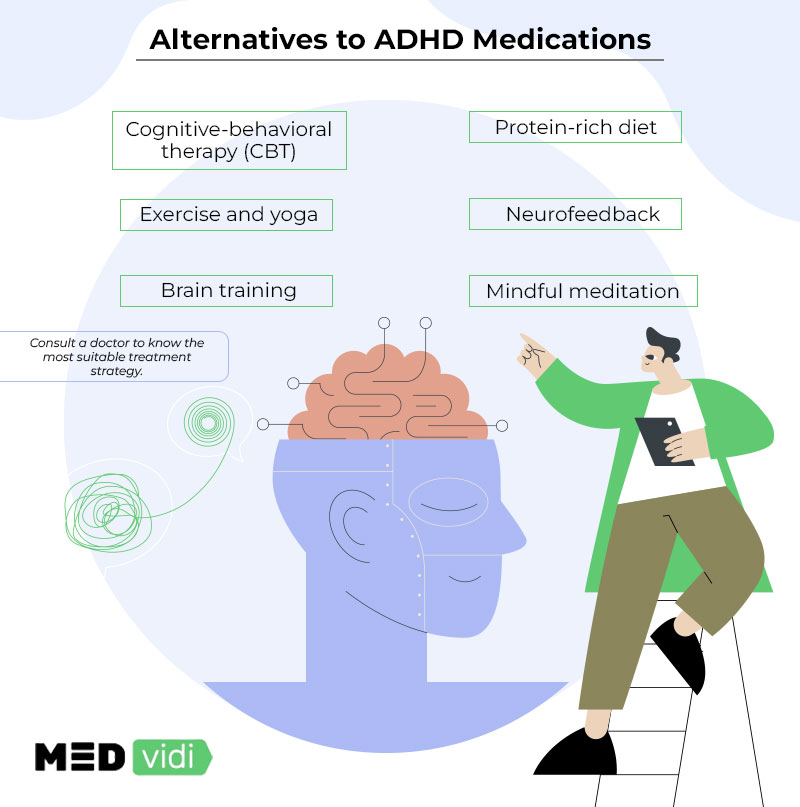Medication Management Solutions for Safe Mental Health Treatments
Medication Management Solutions for Safe Mental Health Treatments
Blog Article
Checking Out Efficient ADHD Therapy Alternatives for All Ages
The intricacies of Attention Deficit Hyperactivity Disorder (ADHD) present unique difficulties throughout various age groups, requiring a detailed exploration of effective treatment options. A combination of behavioral therapies, pharmacological treatments, and way of living alterations has actually revealed promise in dealing with the diverse needs of people with ADHD.
Comprehending ADHD and Its Effect
Attention-Deficit/Hyperactivity Disorder (ADHD) is a neurodevelopmental condition characterized by relentless patterns of negligence, hyperactivity, and impulsivity that can dramatically impact numerous facets of an individual's life. It typically materializes in childhood years, although symptoms can continue into the adult years. The core signs of ADHD can interfere with academic performance, hinder social communications, and complicate occupational ventures.
People with ADHD commonly battle with maintaining emphasis on jobs, arranging activities, and following via on directions, which can cause scholastic underachievement (Depression Treatment). In social contexts, impulsivity may result in problems in forming and sustaining connections, as individuals may interrupt discussions or make rash decisions without thinking about effects
In addition, ADHD can co-occur with other mental health conditions, such as anxiety and depression, additionally complicating medical diagnosis and therapy. The variability in signs and symptom discussion means that ADHD can impact people in a different way, demanding an individualized strategy to administration. Comprehending ADHD's diverse impact is important for creating reliable methods that sustain people in browsing day-to-day challenges and achieving their potential. Comprehensive understanding of ADHD's nature and ramifications lays the foundation for discovering appropriate treatment choices customized per person's needs.
Behavioral Therapies for ADHD
Numerous behavior modifications have been created to efficiently attend to the difficulties connected with ADHD, concentrating on modifying specific behaviors and promoting important skills. Among the most recognized strategies are cognitive-behavioral treatment (CBT), parent training, and social skills training.
CBT aids individuals identify and transform adverse idea patterns and actions, promoting an extra positive outlook and boosted self-regulation. This treatment commonly includes functional techniques for taking care of impulsivity and improving company. Parent training programs empower caretakers by furnishing them with strategies to strengthen positive habits and established constant borders, which can be especially valuable for youngsters with ADHD.
Social skills training is one more essential part, teaching people with ADHD how to interact successfully with peers - Depression Treatment. This method typically involves role-playing and feedback to improve interaction, cooperation, and dispute resolution skills
Integrating these behavior modifications into a thorough treatment plan can dramatically boost working and lifestyle for individuals with ADHD. Inevitably, the efficiency of these treatments depends on tailored strategies that consider the distinct demands of each person, therefore cultivating durability and adaptability in day-to-day live.
Drug Options Available
For many people with ADHD, drug can play a substantial duty in taking care of symptoms and enhancing overall functioning. Both key classifications of medicines recommended for ADHD are stimulants and non-stimulants.
Stimulants, such as methylphenidate and amphetamine-based medications, are the most frequently utilized treatments. These medications function by raising the levels of neurotransmitters, especially dopamine and norepinephrine, in the brain, which aids boost focus and lower impulsivity and attention deficit disorder. They often yield quick outcomes, making them a favored option for lots of people.

It is necessary for medical care service providers to carry out a comprehensive evaluation to figure out one of the most suitable medication based on private demands, case history, and possible weblink negative effects. Regular follow-up and monitoring are also important to make sure the performance of the chosen treatment and to make any type of necessary changes.
Lifestyle Adjustments to Think About
Handling ADHD efficiently expands beyond medication, as lifestyle adjustments can considerably improve total health and sign useful site control. Including organized routines is important; consistent schedules aid people with ADHD handle their time properly and decrease sensations of bewilder.
Regular exercise is an additional crucial component. Exercise not just aids to enhance concentration yet additionally improves mood and reduces stress degrees. Activities such as yoga or group sports can be specifically valuable, advertising both fitness and social communication.
Nutrition likewise plays a critical duty. Depression Treatment. A balanced diet regimen abundant in omega-3 fats, whole grains, and lean healthy proteins can contribute to boosted focus and cognitive feature. Limiting sugar and processed foods is recommended, as these can intensify attention deficit disorder and impulsivity
Sleep hygiene is crucial for managing ADHD signs. Establishing a routine rest routine and developing a restful atmosphere can boost rest top quality, leading to far better attention and emotional regulation.
Alternate and All Natural Approaches
Alternative and alternative strategies to ADHD therapy provide a diverse variety of alternatives that enhance traditional approaches. These approaches frequently focus on way of living adjustments, nutritional interventions, and therapeutic practices that intend to enhance total well-being while dealing with ADHD signs.

Mindfulness and behavior modifications are also acquiring grip as all natural treatments. Practices such as yoga, meditation, and cognitive-behavioral therapy can cultivate self-regulation and boost focus. These their explanation methods support emotional resilience, which is particularly useful for individuals with ADHD.
Natural supplements, such as ginkgo biloba and ginseng, are sometimes checked out; nevertheless, it is critical to consult health care experts before integrating these right into treatment plans. While alternative and holistic methods can offer useful support, they should ideally be used along with evidence-based treatments to achieve optimal outcomes for taking care of ADHD throughout all ages.
Conclusion
In summary, effective ADHD therapy demands a thorough strategy that consists of behavior modifications, drug, way of life adjustments, and alternative methods. Customized treatments can substantially improve individuals' functioning and lifestyle, while ideal medicine guarantees optimal signs and symptom monitoring. Moreover, taking on organized routines, involving in routine physical activity, and exercising mindfulness can enhance emotional law and focus. This diverse technique emphasizes the value of personalized treatment in resolving the diverse needs of people with ADHD across all age teams.
Report this page